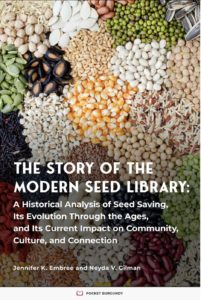Alexandria, VA, September 2024—The Council on Library and Information Resources (CLIR) announces the publication of The Story of the Modern Seed Library: A Historical Analysis of Seed Saving, Its Evolution Through the Ages, and Its Current Impact on Community, Culture, and Connection, by Jennifer K. Embree and Neyda V. Gilman. This report is the latest addition to CLIR’s Pocket Burgundy series.
The Story of the Modern Seed Library explores the relationship between humans and seeds, from the first agricultural societies 12,000 years ago to the modern era of centralized agribusiness corporations. The report argues that seeds, like any resource, have been a tool for human power, control, and development. As genetic biodiversity in plant life collapses due to climate change, Embree and Gilman offer seed libraries as a community-centered service that libraries can provide to combat food insecurity while celebrating biodiversity.
The authors hope readers will gain an increased understanding of the importance of seeds and their role in history and modern life. “The main thing I hope people walk away with is an increased understanding of the amazingness of seeds and how expansive of a role they play in our world. Also, how much history impacts our modern day in unexpected ways,” says Gilman.
In an era of increasing climate uncertainty and food security concerns, seed libraries represent a grassroots approach to preserving agricultural heritage and promoting sustainable food systems. These initiatives not only protect plant diversity but also foster community resilience and connection to local ecosystems.
The report highlights the significant impact of colonization on agricultural systems and biodiversity. “Learning that the Irish Potato Famine and Great Britain’s identity as a country of tea drinkers can all be traced back to a lack of genetic diversity in crops was both fascinating and devastating,” Embree notes. “It also demonstrates why modern grassroots programs that support biodiversity like community seed libraries are so important to support and grow today.”
Co-authors Embree and Gilman, both faculty-ranked academic librarians at Binghamton University, were inspired to write the publication as they worked together to launch their library’s Sustainability Hub in 2021, which includes the campus’s first seed library. Gilman said, “For me, the process of building the seed library, and my continued personal growth as a seed-saver, opened up so many more questions and ideas about seeds and their history with humans. I began to more fully understand that the connection I felt to seeds is something people experience in a variety of ways.”
“The most important thing that I learned in researching this report was just the sheer scale of the impact that colonization has had on both our past and current agricultural systems, particularly in destroying biodiversity,” added Embree. “Modern grassroots programs that support biodiversity like community seed libraries are so important to create and grow today. I hope that this is what readers will take away from reading this piece!”
The authors see a broad audience for this work. “I think librarians interested in establishing a seed library, or even just librarians interested in sustainability initiatives, will be particularly drawn to it. However, I think the audience could even expand beyond the library and information science fields and be of interest to anthropologists, science historians, and more!” Embree explains.
The Story of the Modern Seed Library is part of the CLIR Pocket Burgundy series, which features concise publications on topics within the information and cultural heritage sectors. To access this free publication and others from CLIR, visit clir.org/pubs/reports.
About the Authors:
Neyda V. Gilman is the assistant head of sustainability & STEM engagement and a subject librarian for Environmental Studies and Health Sciences at Binghamton University in Binghamton, New York. She is also a co-founder of the Binghamton University Libraries’ Sustainability Hub and Seed Library. Gilman has a bachelor’s degree in Medical Laboratory Science from the University of Utah and a master’s degree in Library and Information Science from the University at Buffalo. She enjoys reading, video games, organizing her seed collection, and chasing her two cats around the garden.
Jennifer K. Embree is the Sustainability Hub coordinator and subject librarian for Biology, Psychology, Comparative Literature, Translation Research, and Latin American and Caribbean Area Studies at Binghamton University. She is also a co-founder of the Binghamton University Libraries’ Sustainability Hub and Seed Library. Embree earned bachelor’s degrees in English and Psychology from the University of Connecticut and a master’s degree in Library Science from the University of North Carolina-Chapel Hill. In her free time, she loves to garden, hike with her dog Banjo, and binge-watch British comedy shows.
About the Council on Library and Information Resources:
The Council on Library and Information Resources (CLIR) is an independent, nonprofit organization that forges strategies to enhance research, teaching, and learning environments in collaboration with libraries, cultural institutions, and communities of higher learning.
For media inquiries, please contact:
Lizzi Albert
Deputy Operations Officer
lalbert@clir.org


